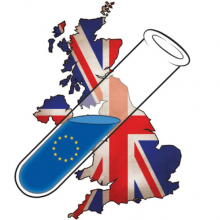Difference between revisions of "Scientists for EU"
Richard Bew (talk | contribs) (→Donors) |
Richard Bew (talk | contribs) |
||
| Line 1: | Line 1: | ||
| − | [[File:Scientists_for_EU_.png | | + | [[File:Scientists_for_EU_.png |220px|thumb|right|Scientists for EU, Source: Scientists4EU Twitter [https://twitter.com/scientists4eu/ Twitter S4EU] ]] |
'''Scientists for EU''' is a campaign run by UK scientists and the scientific community to keep the UK part of the EU in the referendum on its membership, scheduled for 23 June 2016. | '''Scientists for EU''' is a campaign run by UK scientists and the scientific community to keep the UK part of the EU in the referendum on its membership, scheduled for 23 June 2016. | ||
Revision as of 15:33, 22 June 2016

Scientists for EU is a campaign run by UK scientists and the scientific community to keep the UK part of the EU in the referendum on its membership, scheduled for 23 June 2016.
The groups website contends that:
- 'Science is vital for the UK's economy and quality of life. Science is also at the heart of global, social challenges that face us all. We believe that we can achieve so much more good for the UK and the world from within the EU.' [1]
Advisory board
- Andrew Miller - former Labour Party MP for Ellesmere Port & Neston (1992-2015)
- Laura Sandys - Chair of the European Movement, former Conservative Party MP for South Thanet (2010-2015).
- Dr Julian Huppert - former Liberal Democrats MP for Cambridge (2010-2015)
- Martin Rees - Astronomer royal, Cambridge professor
- Nick Butler - Professor at King's Policy Unit, co-founder of Centre for European Research [1]
Brexit 'risks British science'
Nobel Prize winner and lead UK scientist Professor Sir Paul Nurse has stated at a news briefing that British exit from the European Union would make funding research more difficult and 'sell future generations short'. He went on to add: 'We need a vision for our future that is ambitious and not to run away and bury our heads in the sand, and we can best do this by staying in the EU. We should not be side-tracked by short-term political opportunism'
Professor James Wilsdon, professor of research policy at Sheffield University, echoed this idea, fearing it highly unlikely that UK scientists would have the same access to grants and funding if Britain did withdraw: 'At a time when science is getting more collaborative, more international in scale and more tightly focussed on the big societal challenges we face - the EU is a brilliant mechanism for doing science at that scale and we would be mad to turn our backs on a mechanism for collaboration that we have painstakingly built up over 25 years or more, to return to a pre-collaborative mode in which we are doing it on our own.'
Minister for Science Jo Johnson also believes Brexit would be damaging for UK science on a whole: 'No-one doubts Britain could stay a science player outside of the EU. Indeed, some of our universities have been successful for longer than many of its member states have even existed. But the risks to valuable institutional partnerships, to flows of bright students and to a rich source of science funding mean the Leave campaign has serious questions to answer.' [2]
Donors
Recorded by the Electoral Commission:
| Date | Name of donor | Amount |
|---|---|---|
| 08/04/2016 | David Sainsbury | £50,000.00 |
| 10/03/2016 | Ewan Kirk | £10,000.00 |
Notes
- ↑ 1.0 1.1 Home page, Scientists for EU, accessed 13 May 2016
- ↑ Pallab Ghosh, 'EU exit 'risks British Science', 26 February 2016, BBC News, accessed 17 May 2016
- ↑ Electoral Commission, Donation Search, accessed 12 May 2016